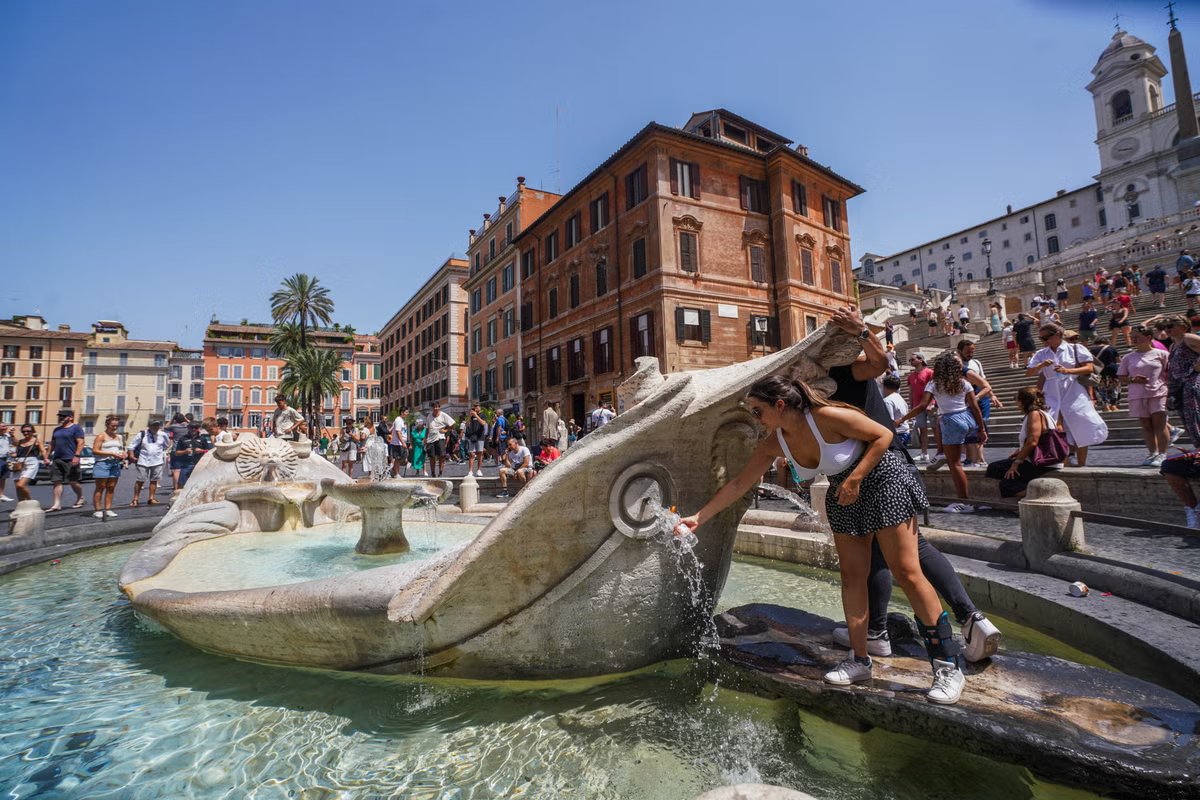
Tourists have been warned to take care as Southern Europe swelters in a heatwave where temperatures have pushed well past 40C – with Italy reporting the death of a street sign painter.
The 44-year-old worker collapsed while working in the northern town of Lodi on Tuesday. He was taken to hospital but doctors were unable to revive him, according to local media.
Nations across Southern Europe have issued advice to residents and tourists, as millions head off to the Mediterranean to take a summer break. It has ranged from warnings against holidaymakers drinking too heavily in the heat, to how to sleep well during sweltering nights. Air-conditioned areas are also being opened so that people can shelter from the extreme temperatures.
Thermometers could spike as high as 45C to 48C in parts of Sicily and Sardinia in Italy and Cordoba and Seville in Spain before the week is out. Temperatures are also starting to tick up in Greece, and are forecast to reach up to 44C in some parts of the country in the coming days. The heatwave was named “Cerberus” after the three-headed monster dog which guards the gates of the underworld in Greek mythology.
In Italy, 10 cities were put on high heat alert for older people and other vulnerable populations from Bolzano in the north extending southward to Bologna, Florence and Rome. In Greece, authorities banned access to nature reserves and forests to reduce the risk of wildfires, while municipalities were opening air-conditioned areas in public buildings for people to shelter from the heat.
People cool off on a beach in Barcelona— (AP)
Ruben del Campo, of Aemet, the Spanish state meteorological agency, said: “In some points of the south the temperatures will reach 44C on Wednesday. More than 100 weather stations registered temperatures of at least 35C as early as 6am on Wednesday.
“In general, in Andalusia, temperatures will be above 40C. The heat will be suffocating in Cordoba and Granada and areas of the Costa del Sol.”
He added: “At night, temperatures will not fall below 25C in Granada, Almeria, Seville and Las Palmas in the Canary Islands.”
Mr Del Campo added that from Thursday temperatures would fall in the Balearic Islands and the east of the country but not in the south and west.
Cristina Linares, co-director of climate, health, and urban environment at the Carlos III Institute of Health in Madrid, proposed that Spain and other natons should also be using libraries, health centres, churches and public transport as air-conditioned places as shelters for the elderly, pregnant women and those with breathing problems as temperatures soar.
Ms Linares also warned tourists to avoid excessive consumption of alchol in the heat. “People who are not used to living in hot countries should also be warned against heavy drinking of alcohol during heatwaves,” she told The Independent. But some appeared happy to disregard that advice. Jack, 13, a British schoolboy who lives in Barcelona, started selling drinks on the beach with friends. “Most people seem to want cold water and beer but I am not allowed to sell beer. We have done well. I made €7,” he said.
A woman tries to shelter from the heat near the Colosseum in Rome— (Guglielmo Mangiapne/Reuters)
Many homes in Spain battened down the hatches against the heat, with all windows and shutters closed during the day.
In Cádiz, in southern Spain, police used air-conditioning units which were seized in raids on drug factories and installed them in public schools, which are used in summer for children’s camps.
If tourists struggle with the scorching heat during the day, trying to get to sleep at night with temperatures over 25C in many parts of Spain will not be easy.
Spain’s state-run RTVE television broadcast a report advising people on the tricks to sleep properly during a heatwave.
“Sleep near a window, wear little in the way of clothes, drink as much as you can and, if you still cannot sleep, put on the air conditioning,” the reporter told viewers.
Greece’s agriculture ministry also issued restrictions on the transportation and working hours of animals such as horses and donkeys offering rides in tourist areas during the heatwave. Animals will not be allowed to work between noon and 5pm on days where temperatures are between 35C to 39C in the shade, while they will not be allowed to work at any time of the day when temperatures exceed that range.
Even as temperatures climb, storms in Italy's populous northern Lombardy region caused flooding, felled trees and ripped roofs off buildings. More than 200 firefighters responded to emergencies in the regional capital of Milan, Varese, near the Malpensa airport, Lecco, near Lake Como, Sondrio, located in the Alps, and Bergamo.
Extreme heatwaves contributed to more than 60,000 deaths in Europe in 2022, according to a report issued earlier this week.
The study, conducted by the Barcelona Institute for Global Health (ISGlobal) and published in the journal Nature Medicine, estimated that 61,672 deaths were caused by extreme heat in Europe between 30 May and 4 September 2022.
The highest temperature in European history was recorded in Syracuse, in Sicily in August 2021 at 48.8C.







